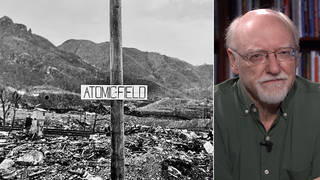
Topics
By Amy Goodman with Denis Moynihan
New details are emerging that indicate the Fukushima nuclear disaster in Japan is far worse than previously known, with three of the four affected reactors experiencing full meltdowns. Meanwhile, in the U.S., massive flooding along the Missouri River has put Nebraska’s two nuclear plants, both near Omaha, on alert. The Cooper Nuclear Station declared a low-level emergency and will have to close down if the river rises another 3 inches. The Fort Calhoun nuclear power plant has been shut down since April 9, in part due to flooding. At Prairie Island, Minn., extreme heat caused the nuclear plant’s two emergency diesel generators to fail. Emergency-generator failure was one of the key problems that led to the meltdowns at Fukushima.
In May, in reaction to the Fukushima disaster, Nikolaus Berlakovich, Austria’s federal minister of agriculture, forestry, environment and water management, convened a meeting of Europe’s 11 nuclear-free countries. Those gathered resolved to push for a nuclear-free Europe, even as Germany announced it will phase out nuclear power in 10 years and push ahead on renewable-energy research. Then, in last week’s national elections in Italy, more than 90 percent of voters resoundingly rejected Prime Minister Silvio Berlusconi’s plans to restart the country’s nuclear power program.
Leaders of national nuclear-energy programs are gathering this week in Vienna for the International Atomic Energy Agency’s Ministerial Conference on Nuclear Safety. The meeting was called in response to Fukushima. Ironically, the ministers, including U.S. Nuclear Regulatory Commission (NRC) Chairman Gregory Jaczko, held their meeting safely in a country with no nuclear power plants. Austria is at the forefront of Europe’s new anti-nuclear alliance.
The IAEA meeting was preceded by the release of an Associated Press report stating that consistently, and for decades, U.S. nuclear regulators lowered the bar on safety regulations in order to allow operators to keep the nuclear plants running. Nuclear power plants were constructed in the U.S. in the decades leading up to the Three Mile Island disaster in 1979. These 104 plants are all getting on in years. The original licenses were granted for 40 years.
The AP’s Jeff Donn wrote, “When the first ones were being built in the 1960s and 1970s, it was expected that they would be replaced with improved models long before those licenses expired.” Enormous upfront construction costs, safety concerns and the problem of storing radioactive nuclear waste for thousands of years drove away private investors. Instead of developing and building new nuclear plants, the owners—typically for-profit companies like Exelon Corp., a major donor to the Obama campaigns through the years—simply try to run the old reactors longer, applying to the NRC for 20-year extensions.
Europe, already ahead of the U.S. in development and deployment of renewable-energy technology, is now poised to accelerate in the field. In the U.S., the NRC has provided preliminary approval of the Southern Company’s planned expansion of the Vogtle power plant in Georgia, which would allow the first construction of new nuclear power plants in the U.S. since Three Mile Island. The project got a boost from President Barack Obama, who pledged an $8.3 billion federal loan guarantee. Southern plans on using Westinghouse’s new AP1000 reactor. But a coalition of environmental groups has filed to block the permit, noting that the new reactor design is inherently unsafe.
Obama established what he called his Blue Ribbon Commission on America’s Nuclear Future. One of its 15 members is John Rowe, the chairman and chief executive officer of Exelon Corp. (the same nuclear-energy company that has lavished campaign contributions on Obama). The commission made a fact-finding trip to Japan to see how that country was thriving with nuclear power—one month before the Fukushima disaster. In May, the commission reiterated its position, which is Obama’s position, that nuclear ought to be part of the U.S. energy mix.
The U.S. energy mix, instead, should include a national jobs program to make existing buildings energy efficient, and to install solar and wind-power technology where appropriate. These jobs could not be outsourced and would immediately reduce our energy use and, thus, our reliance on foreign oil and domestic coal and nuclear. Such a program could favor U.S. manufacturers, to keep the money in the U.S. economy. That would be a simple, effective and sane reaction to Fukushima.
Amy Goodman is the host of “Democracy Now!,” an independent, daily global TV/radio news hour airing on more than 950 stations in the United States and around the world. She is the author of “Breaking the Sound Barrier,” recently released in paperback and now a New York Times best-seller.
© 2011 Amy Goodman












Media Options